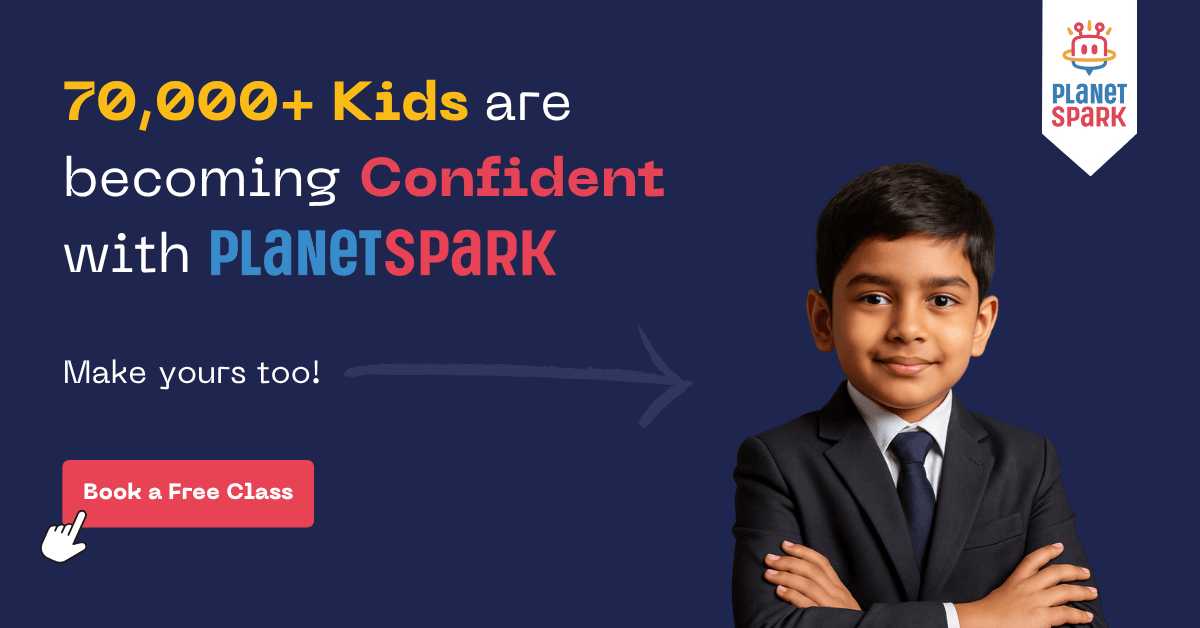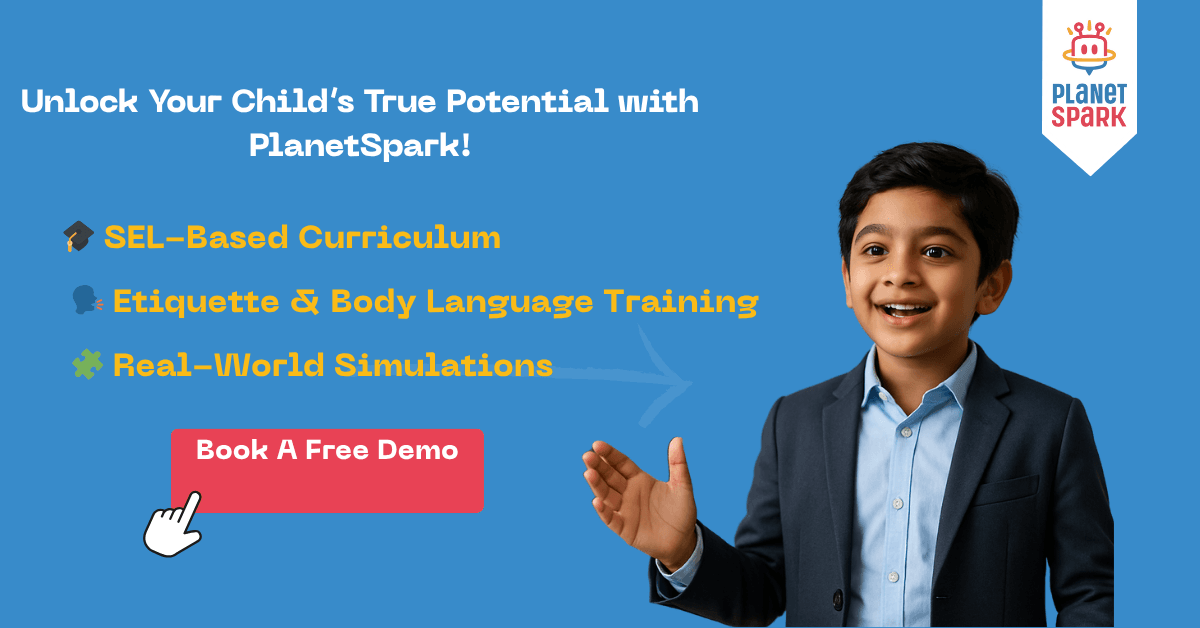Types of Personality Development : Guide for Nurturing Children

This blog explores everything you need to know about personality development from key psychological theories and childhood development stages to various types like emotional, social, and moral development. Whether you're a parent or educator, this guide offers insights to help raise confident, well-rounded individuals. PlanetSpark’s expert-led programs also play a significant role in guiding children through this journey.
What is Personality Development?
Personality development refers to the process through which individuals develop a distinct set of behaviors, traits, emotions, and attitudes that make them unique. It involves the enhancement of self-awareness, social skills, emotional intelligence, confidence, and communication abilities.

Types of Personality Traits:
- Introversion vs. Extroversion
- Agreeableness
- Conscientiousness
- Emotional Stability
- Openness to Experience
These traits, often measured using the Big Five Personality Model (OCEAN), form the foundation of one’s personality.
Theories of Personality Development
Several psychological theories explain how personality is formed and developed:
a) Freud’s Psychosexual Theory
- Personality is shaped by childhood experiences.
- Development occurs through five stages: oral, anal, phallic, latency, and genital.
- Emphasis on the role of the unconscious mind.
b) Erikson’s Psychosocial Theory
- Development occurs across eight stages throughout life.
- Each stage involves a crisis or challenge that influences personality.
- Examples: Trust vs. Mistrust (infancy), Identity vs. Role Confusion (adolescence).
c) Piaget’s Cognitive Development Theory
- Although focused on cognitive abilities, Piaget’s theory contributes to understanding personality.
- Stages include sensorimotor, preoperational, concrete operational, and formal operational.
- Mental growth impacts personality traits such as independence and problem-solving.
d) Bandura’s Social Learning Theory
- Emphasizes learning through observation and imitation.
- Reinforcement and modeling shape personality.
e) Trait Theory
- Focuses on identifying and measuring individual personality traits.
- Includes the Big Five Personality Traits.
f) Humanistic Theories (Maslow, Rogers)
- Emphasis on self-actualization and personal growth.
- Personality develops as individuals strive to meet their potential.
Stages of Personality Development in Children
a) Infancy (0–2 years)
- Development of trust and emotional attachment.
- Formation of basic temperament.
b) Early Childhood (3–6 years)
- Rapid development of language, self-concept, and social interaction.
- Emergence of independence and initiative.
c) Middle Childhood (7–12 years)
- Increased peer influence.
- Development of competence and self-confidence.
d) Adolescence (13–19 years)
- Identity formation.
- Emotional regulation, self-esteem, and autonomy.
Types of Personality Development
a) Emotional Development
- Understanding, expressing, and managing emotions.
- Empathy, resilience, and emotional intelligence.
b) Social Development
- Building interpersonal relationships.
- Cooperation, sharing, communication, and teamwork.
c) Cognitive Development
- Growth of reasoning, problem-solving, and critical thinking.
- Impact on decision-making and behavior.
d) Moral Development
- Understanding right and wrong.
- Development of conscience and ethical values.
e) Physical and Behavioral Development
- Impact of physical health and habits on confidence and personality.
- Includes hygiene, posture, grooming, and overall body language.
f) Communication and Linguistic Development
- Ability to express thoughts effectively.
- Confidence in speaking and active listening.
g) Creative and Aesthetic Development
- Expression through art, music, and imaginative play.
- Enhances self-expression and emotional depth.
Factors Influencing Personality Development
a) Heredity
- Genetic makeup influences temperament and behavioral tendencies.
b) Environment
- Family, school, neighborhood, and cultural background play a huge role.
c) Parenting Style
- Authoritative, permissive, and authoritarian parenting have different impacts.
d) Peer Influence
- Social acceptance, bullying, and friendships shape identity and confidence.
e) Education and Teachers
- Teachers as role models.
- Curriculum and classroom environment influence personality traits.
f) Media and Technology
- Exposure to content impacts behavior, values, and emotional responses.
g) Life Experiences and Challenges
- Handling setbacks, responsibilities, and achievements builds character.
h) Nutrition and Physical Health
- A healthy body contributes to mental and emotional well-being.
Importance of Personality Development in Children
- Builds confidence and self-esteem.
- Enhances communication and leadership skills.
- Prepares children to face life challenges positively.
- Encourages adaptability and lifelong learning.
Role of Parents and Educators
- Creating a safe, nurturing, and encouraging environment.
- Supporting interests and talents.
- Consistent feedback and positive reinforcement.
- Teaching by example modeling good behavior and values.
Activities to Foster Personality Development in Children
- Storytelling and reading
- Group activities and games
- Role-playing and drama
- Public speaking and debates
- Art, dance, and music
- Volunteering and responsibility-sharing

How PlanetSpark Supports Personality Development in Children
At PlanetSpark, we understand that developing a child’s personality is just as important as academic success. Our live 1:1 online classes focus on key aspects of personality development such as public speaking, confidence building, creative expression, and critical thinking.
Here’s what makes our program unique:
- Holistic Curriculum Beyond Academics: We cover self-awareness, goal setting, peer interaction, communication etiquette, leadership, and critical thinking.
- Social-Emotional Learning (SEL) Based Design: Especially beneficial for younger kids, our curriculum emphasizes emotional awareness and self-regulation.
- Practical, Activity-Based Learning: Children participate in mock interviews, journaling, public introductions, feedback sharing, and real-life simulations. Role plays, case studies, and exercises ensure continuous learning.
- Leadership & Self-Presentation Training: Soft skills like empathy, responsibility, assertiveness, and teamwork are developed through challenges, storytelling, and presentations.
- Confidence Meter & Parent Consultations: Regular PTMs help parents and teachers assess progress in confidence, leadership, and overall personality growth.
- Etiquette and Body Language Sessions: We train children in eye contact, posture, respectful tone modulation, and other grooming essentials.
PlanetSpark’s expert-led programs blend psychology-backed methods with engaging activities to ensure every child’s growth journey is personalized, measurable, and enjoyable.
Conclusion
Personality development is a dynamic, multifaceted process shaped by both internal and external influences. Understanding the types of personality development and the theories behind them provides valuable insight into nurturing well-rounded individuals. By focusing on emotional, social, moral, and cognitive growth, parents and educators can help children become confident, empathetic, and resilient human beings. With conscious efforts and the right environment, personality is not just developed, it is empowered
Personalized Communication Report
Record a video to get a AI generated personalized communication report for your child

Hi There, want to try these
tips for your child with
LIVE with our expert coach?
Let's check your child's
English fluency
